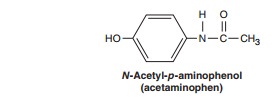Chapter: Basic & Clinical Pharmacology : Nonsteroidal Anti-Inflammatory Drugs, Disease-Modifying Antirheumatic Drugs, Nonopioid Analgesics,& Drugs Used in Gout
Acetaminophen
ACETAMINOPHEN
Acetaminophen is the
active metabolite of phenacetin and is responsible for its analgesic effect. It
is a weak COX-1 and COX-2 inhibitor in peripheral tissues and possesses no
significant anti-inflammatory effects.

Pharmacokinetics
Acetaminophen
is administered orally. Absorption is related to the rate of gastric emptying,
and peak blood concentrations are usually reached in 30–60 minutes.
Acetaminophen is slightlybound to plasma proteins and is partially metabolized
by hepatic microsomal enzymes and converted to acetaminophen sulfate and
glucuronide, which are pharmacologically inactive (see Figure 4–5). Less than
5% is excreted unchanged. A minor but highly reactive metabolite (N-acetyl-p-benzoquinone) is impor-tant in large doses because it is toxic to
both liver and kidney . The half-life of acetaminophen is 2–3 hours and is
relatively unaffected by renal function. With toxic doses or liver disease, the
half-life may be increased twofold or more.
Indications
Although
said to be equivalent to aspirin as an analgesic and antipyretic agent,
acetaminophen differs in that it lacks anti-inflammatory properties. It does
not affect uric acid levels and lacks platelet-inhibiting effects. The drug is
useful in mild to moder-ate pain such as headache, myalgia, postpartum pain,
and other cir-cumstances in which aspirin is an effective analgesic.
Acetaminophen alone is inadequate therapy for inflammatory conditions such as
rheumatoid arthritis, although it may be used as an analgesic adjunct to
anti-inflammatory therapy. For mild analgesia, acetaminophen is the preferred
drug in patients allergic to aspirin or when salicylates are poorly tolerated.
It is preferable to aspirin in patients with hemo-philia or a history of peptic
ulcer and in those in whom bronchos-pasm is precipitated by aspirin. Unlike
aspirin, acetaminophen does not antagonize the effects of uricosuric agents; it
may be used con-comitantly with probenecid in the treatment of gout. It is
preferred to aspirin in children with viral infections.
Adverse Effects
In therapeutic doses,
a mild increase in hepatic enzymes may occa-sionally occur in the absence of
jaundice; this is reversible when the drug is withdrawn. With larger doses,
dizziness, excitement, and disorientation may occur. Ingestion of 15 g of acetaminophen
may be fatal, death being caused by severe hepatotoxicity with centri-lobular
necrosis, sometimes associated with acute renal tubular necrosis. Present data
indicate that 4–6 g acetaminophen is associated with increased liver function
test abnormalities. Doses greater than 4 g/d are not usually recom-mended and a
history of alcoholism contraindicates even this dose. Early symptoms of hepatic
damage include nausea, vomiting, diar-rhea, and abdominal pain. Cases of renal
damage without hepatic damage have occurred, even after usual doses of
acetaminophen. Therapy is much less satisfactory than for aspirin overdose. In
addi-tion to supportive therapy, the measure that has proved most useful is the
provision of sulfhydryl groups in the form of acetylcysteine to neutralize the
toxic metabolites .
Hemolytic
anemia and methemoglobinemia are very rare adverse events. Interstitial
nephritis and papillary necrosis—serious compli-cations of phenacetin—have not
occurred nor has GI bleeding. Caution is necessary in patients with any type of
liver disease.
Dosage
Acute pain and fever
may be effectively treated with 325–500 mg four times daily and proportionately
less for children. Dosing in adults is now recommended not to exceed 4 g/d, in
most cases.
Related Topics